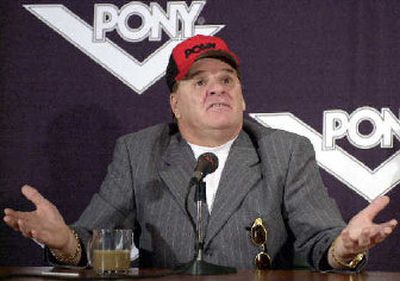Bonds’ biggest threat: taxes

SAN FRANCISCO – The easy money Barry Bonds made by aggressively selling his name, likeness and sports equipment through his Web site and brief autograph sessions in hotel conference rooms could prove to be the embattled slugger’s legal undoing.
A federal grand jury is probing whether he paid taxes on some of that fortune, and key government witnesses include a scorned business partner and a jilted lover who profited from the name “Barry Bonds.” He also is being investigated for allegedly lying to another federal grand jury about his steroid use.
Legal analysts said proving the Giants star cheated the IRS out of its cut of memorabilia sales is far easier to prove than perjury.
If so, Bonds wouldn’t be the first professional athlete to run afoul of the IRS over sales of autographed jerseys, balls and baseball cards.
Pete Rose in 1990 served five months in prison for not reporting income from memorabilia. Several other prominent players – including Darryl Strawberry and Hall of Famers Duke Snider and Willie McCovey – were busted in the 1990s for not properly reporting such income.
Brian Hennigan, a Los Angeles lawyer who represented Strawberry when the baseball player pleaded guilty to tax evasion in 1995, said it’s relatively easy to fall into tax trouble because the memorabilia business is largely cash-and-carry.
Sports memorabilia is a multimillion-dollar enterprise for professional athletes. Bonds sells his jerseys for as much as $1,900 on his Web site.
“The money is so easily accessible,” Hennigan said. “There’s going to be a lot of cash, and the promoter says ‘Here is an envelope, it’s full of cash’ and it’s just handed to you and you drive away and there aren’t any forms to sign.”
Strawberry was sentenced to six months of home confinement and ordered to pay $350,000 in back taxes. Other athletes have paid fines and back taxes to settle their tax problems.
“The sentence certainly depends on how much money is involved and how long it has been going on,” Hennigan said. “If the athlete gets a lot of cash and never reports any of it, more likely than not the government is going to look at it harshly.”
A Bonds indictment could come as soon as today or Thursday, when the grand jury investigating his case is expected to end its service.
But the grand jury’s term could be extended or a new panel could be given the investigation, former prosecutors said.
Nonetheless, it’s clear Bonds is in a legal pickle. Laura Enos, one of Bonds’ attorneys, said the slugger’s legal team would be “crazy” if it was not preparing a defense, although she said her client is innocent and should not be indicted. She said she has no knowledge of a pending indictment.
Bonds’ latest legal troubles began in 2003, after he told federal authorities that boyhood friend Steve Hoskins, who ran his memorabilia business, had forged his signature on contracts and sold his gear without permission.
But Hoskins countered that Bonds was giving tens of thousands of dollars in cash made from the sales to Bonds’ then-girlfriend, Kimberly Bell, according to Hoskins’ attorney, Michael Cardoza. Bell didn’t return telephone calls.
At times, Bonds sold autographed baseballs “as fast as he could” for $100 apiece, Cardoza said. Bonds would arrange the signing sessions when Bell complained that she needed cash, according to Aphrodite Jones, who spent six months with Bell in a failed bid to publish a book about Bell’s affair with Bonds.